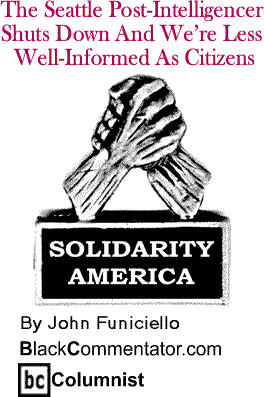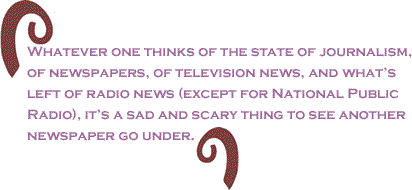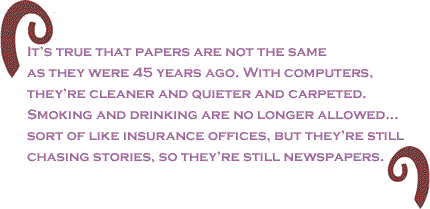
|
|||||||||||||||||||||||

|
|

Custom Search
|
|
 |
|
People who read and consider themselves well-informed about politics, the economy, and their lives, in general, will be a little less-well-informed today, because on Tuesday, the Seattle Post-Intelligencer stopped its presses. It was the last edition for yet another large daily newspaper and the loss is not just for the unionized workers who did every job in the place when the presses literally hummed—roared, really—as the first editions hit the street, but it’s a loss for those who take their news seriously. Whatever one thinks of the state of journalism, of newspapers, of television news, and what’s left of radio news (except for National Public Radio), it’s a sad and scary thing to see another newspaper go under. The P-I is still going to produce some semblance of “news,” however. It will be an on-line version and it will be done with a fraction of its former staff. Those workers, of course, will be working at lower wages and likely with few or no benefits. There was a rally Monday afternoon in Seattle, to show support for the workers of the P-I and it was attended by the paper’s workers, by some from the Seattle Times, and others from the Pacific Northwest Newspaper Guild, the union which represented P-I reporters and editors and others at the paper.
Attendees probably felt a little better to be able to gather and commiserate and talk about what’s next, but it must have been like throwing a party without beer—or food. Some will be able to retire and others, too young to do that, will find other work—public relations, writing for the Internet, barista, or auto mechanic. Whatever it is, it won’t be like a busy newsroom with people writing on deadline, making calls to a source, or drinking coffee and talking politics with fellow reporters or talking the state of the economy with other advertising sales representatives. Even today, newspapers are busy places and a sense of possibility is always there with the next breaking story, even somebody else’s. It’s true that papers are not the same as they were 45 years ago. With computers, they’re cleaner and quieter and carpeted. Smoking and drinking are no longer allowed…sort of like insurance offices, but they’re still chasing stories, so they’re still newspapers. One could sense that they were contemplating the hard times to come, years ago, when the Internet became a fact of life. Most of the papers cut down further on their hard news coverage and slid into the soft stuff—human interest features, life styles, food (restaurant type, not stories about why the food is good or bad and the politics of agriculture), self-help, exercise and sports. They were winnowing out the people who were necessary for the hard stuff. Usually, they were the highest-paid. All of this on the part of newspaper companies
was in preparation for the day that has now come for many newspapers.
The P-I is merely one of the country’s larger daily newspapers to
close. Recently, the The bigger papers are often the unionized papers and, as predictably as the sun’s rising, many of our brethren on the right like to blame the unions for their demise. And, of course, many CEOs and managers want to blame the unions. At the Times Union in Albany, N.Y., one manager was heard to say recently, “...the Guild must die.” He certainly was speaking, without intending to, for managers and employers all over the country. Scapegoating unions has been a right-wing pastime for a half-century. And, for the century before that, it was contact sport. For the first time at the Albany paper, which has become a shadow of its former self, management is threatening to ignore the contract—which they’ve honored for the 75 years of the union’s existence—and impose conditions. Lower pay and fewer benefits and degraded working conditions can’t be far behind. They can threaten this because they have deep pockets for lawyers to fight the union and plenty of money to wait out workers through long court processes. At the end of all that, however, the view could be bleak: an editor or two, supervising skeleton crews in a few departments. For public consumption, though, there will be a happy face put on the whole thing—and it will be a real newspaper, just because they say it is. What have we lost? As noted above, no matter what one thinks of the character of news gathering and dissemination in 2009, there remains the structure of a corporation that supports the news and the seeking of accuracy and truth, wherever that leads a reporter. When the going got tough, lawyers (a different breed from the ones who defend the corporation against its workers) defend the First Amendment rights of the reporter and the paper. This is all part of the history and the value of the American newspaper tradition. Since the "corporatization" of news a few decades ago, the bottom line took precedence and the bean-counters became more important than reporters and editors. That was the beginning of the slide to where they are today. Time was when it was said that “owning a newspaper was like having a license to print money.” Even so, in those days, the owners felt a responsibility to the readers and the communities in which they made their millions. That’s no longer the rule. Climbing the corporate ladder is just as important in the news corporations as any other corporation.
A large percentage of the American people take the attitude that, since newspapers don’t cover what needs to be covered to make for a well-informed electorate, which is what would make for a strong democratic republic, so why should we read them? They think they can get their news from the Internet. While it’s true that there is much that can be trusted on-line, there is much nonsense and misinformation. There is no structure, no peer review, so to speak, and, usually, there is no one to stand behind the news story, except the writer. So, anyone who gets news that way has to be very careful of the source of the news that’s there. There are good sources on the Internet. Fortunately, they are reporters and writers who have retired from newspapers, news agencies, television, or they are writers of books on politics. Unfortunately, most of them are old.
It’s what we’re losing with the demise or downgrading of newspapers. There won’t be a fresh source of news we can read with the same confidence—not for the foreseeable future, at least—and the pundits need reliable original sources of news for them to ply their trade. Without those fresh sources, they’ll have little with which to work. If we’re still to have a functioning democracy we can’t afford to get our news from pundits, alone. BlackCommentator.com Columnist, John Funiciello, is a labor organizer and former union organizer.
His union work started when he became a local president of The Newspaper
Guild in the early 1970s. He was a reporter for 14 years for newspapers
in |
|
Any BlackCommentator.com article may be re-printed so long as it is re-printed in its entirety and full credit given to the author and www.BlackCommentator.com. If the re-print is on the Internet we additionally request a link back to the original piece on our Website. Your comments are always welcome. eMail re-print notice
If you send us an eMail message we may publish all or part of it, unless you tell us it is not for publication. You may also request that we withhold your name. Thank you very much for your readership. |
|
| |
|
| March
19 , 2009 Issue 316 |
|
| Executive Editor: Bill Fletcher, Jr. |
| Managing Editor: Nancy Littlefield |
| Publisher: Peter Gamble |
| Est. April 5, 2002 |
Printer Friendly Version
in resizeable plain
text format or pdf
format. |
| Frequently Asked Questions |
 |

|
 |
 |
 |
| |
| |





































